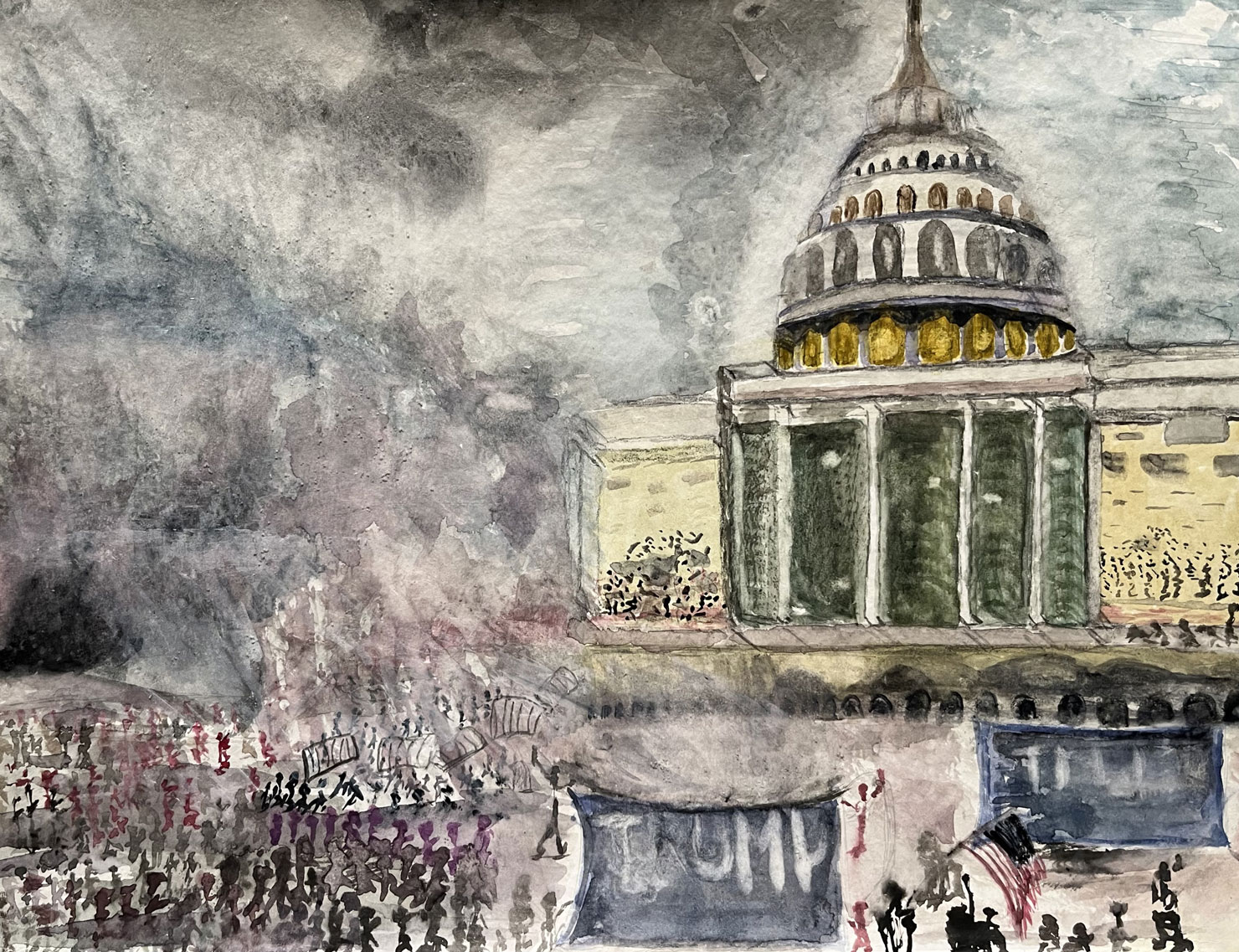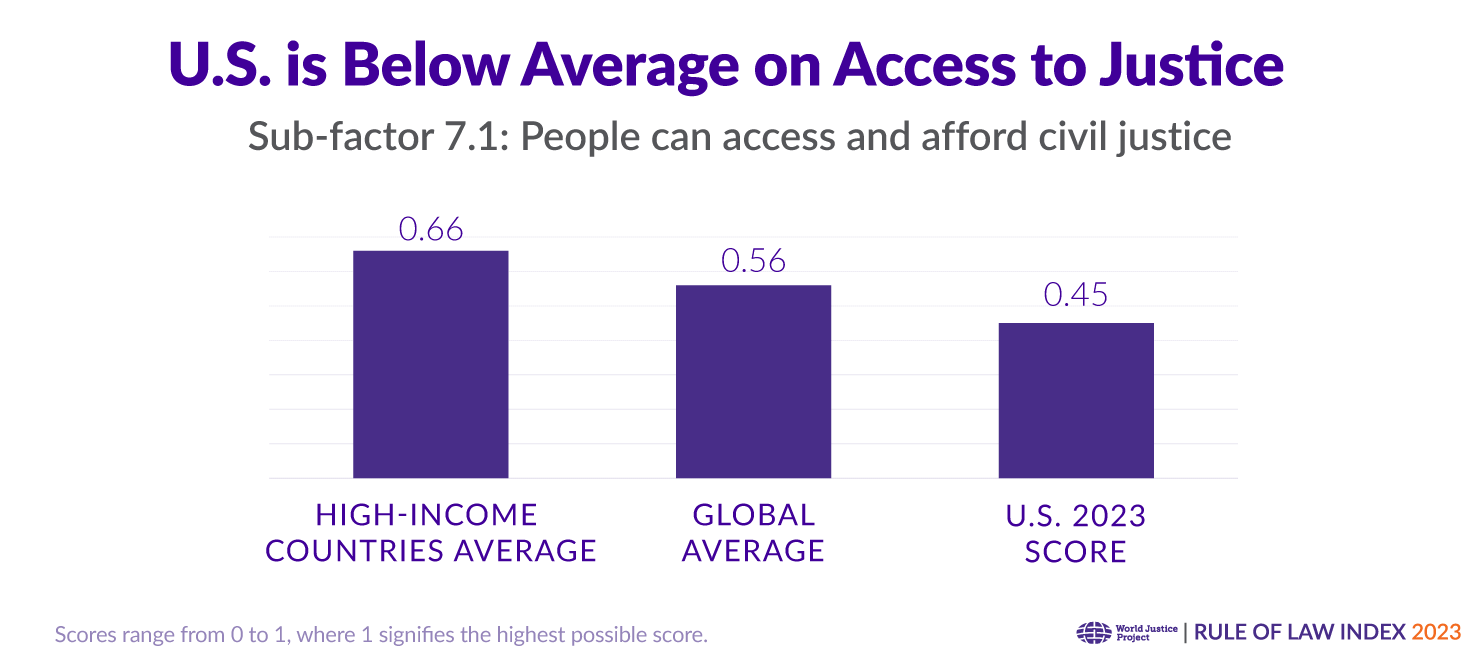

In the United States, the rule of law is front and center this election year. The shadow of the last incendiary presidential election looms larger than ever, and U.S. commitment to universal rule of law principles will be tested on numerous fronts in 2024.
Here are five critical rule of law issues that experts are keeping an eye on:
1. Accountability for January 6th
The 2021 siege of the U.S. Capitol shook the nation’s consciousness on how rhetoric can spin into violent attempts to overthrow election results. The government has made significant strides in accountability for the attack, including the Justice Department charging 1,250 suspects and securing over 890 convictions of siege participants and conspirators.
Attempts to hold Trump accountable for his role started with his second impeachment in the House of Representatives on January 13, 2021. The following month the Senate voted to acquit him on the single charge of incitement of insurrection. Next, a bipartisan Congressional investigation in 2022 yielded reams of evidence, 17 specific findings, and the allegation that former President Trump participated in a “multi-part conspiracy to overturn the lawful results of the 2020 Presidential election.”
However, despite a special counsel investigation and a variety of federal and state charges against Trump for his conduct relating to the 2020 election, none of these criminal cases against him has reached a resolution. “The United States in 2024 is likely to face several challenges testing our ability to resist the threat of despotic autocracy,” said Donald Ayer, who served as deputy attorney general under President George H.W. Bush. “The first is whether our justice system can move quickly enough for timely accountability for the misdeeds of January 6—meaning reaching a verdict in at least one case well before the election.”
Trump is claiming charges against him should be dismissed because he has broad immunity for acts committed while he held the presidency. At a January 9 appeals court hearing, Trump’s lawyer argued that a president could only face prosecution for ordering the assassination of a political rival if the U.S. Congress impeached and convicted him first.
This month, the Supreme Court agreed to decide another major issue: whether states can remove Trump from the ballot under the 14th amendment to the Constitution. Maine and Colorado have already moved to do so, claiming that Trump’s actions on January 6th disqualify him under the amendment’s insurrection clause.
2. Election Integrity
A recent AP-NORC poll shows that two-thirds of Americans believe the upcoming election is important or very important for the future of U.S. democracy. But will it be a peaceful process governed by law?
The United States currently ranks 37th out of 142 countries in the WJP Rule of Law Index when it comes to confidence in the lawful transfer of power. U.S. performance on this Index indicator is down 10% when compared to 2016. But it has partially rebounded from a low point in 2020, when U.S. election confidence ranked just 48th out of 128 countries.
In that year’s presidential election, some government officials refused to follow the law and certify election results, and a 2023 ProPublica review of 10 such instances found that a majority of the officials involved had faced no accountability.
Some dereliction of official election duty could arise again this year, according to Paul M. Smith, senior vice president at the non-partisan Campaign Legal Center. “But the primary concern on my mind these days is the strategic use of violence and threats of violence in an effort to disrupt democratic processes,” he says. “These may take many forms. We already have threats against secretaries of state and other election workers. I can imagine efforts to deter people from voting and also disruption of vote-counting processes. This is all very worrisome.”
A recent poll by the Public Religion Research Institute showed that 23% of Americans now believe that “true American patriots may have to resort to violence in order to save our country.” That’s up from 15% in 2021.
3. Election Results
Once results are reported, there is an open question whether candidates will accept them. After the last election, then-President Donald Trump failed to do so and on January 6, 2021, encouraged his supporters to “stop the steal” and “fight like hell” ahead of their march to the U.S. Capitol. The siege that followed endangered Congressional lives, caused widespread injuries and destruction, and led to multiple deaths.
Despite Congressional certification of 2020 election results and dozens of fruitless court challenges, Trump, now the 2024 Republican frontrunner, and 64% of Republicans still dispute the outcome. So, what happens if Biden is declared the winner in 2024 and Trump again rejects the results?
“I’m less worried about that [this time], because an incumbent has a level of coercive power that a candidate just does not have,” says Rosa Brooks, a Georgetown Law professor who co-led the Transition Integrity Project four years ago. That series of table-top exercises led to the project’s accurate prediction that the 2020 election was likely to spur a “chaotic legal and political landscape” where President Trump would contest the results, both within and beyond legal avenues.
Brooks expects that in 2024, with Biden still in office, the FBI and Department of Homeland Security would be successful in keeping any political violence from getting out of control but says the rule of law concerns could be very different if Trump has a clear-cut win.
“Then the challenge is [if] he does exactly what he said he will do, which is to say, he acts like a dictator and he weaponizes the executive branch to go after his political enemies for revenge.”
4. Trust in the Courts
In 2024, federal and state courts are considering 91 charges against former President Trump, and the Supreme Court will decide controversial cases on the abortion drug, the Second Amendment, and regulatory enforcement. There are numerous ways the high court could get involved in the 2024 election results, too.
Confidence in the judiciary is key to widespread acceptance of these and other legal decisions, which in turn has significant rule of law implications.
“Voluntary compliance with the law is fundamental to maintaining the rule of law within any community,” says Elizabeth Andersen, executive director of the World Justice Project. “When confidence in the courts gets chipped away, people are more likely to disrespect judicial rulings or use threats, coercion, and violence to resolve their disputes.”
Americans’ confidence in the Supreme Court hit new lows in the last two years, with only about 40% expressing approval. In November, the Supreme Court adopted a voluntary ethics code in the wake of numerous controversies over justices benefitting from lavish gifts and travel. However, Senate Judiciary Chair Dick Durbin (D-Ill.) has vowed to continue pursuing legislation this year because the new code “does not include necessary disclosure and enforcement.”
It appears that threats against judges have already become more commonplace. In 2022, federal judges faced 311 credible threats, up from 178 in 2019, according to a Freedom of Information Request by Bloomberg Law. Currently, the FBI and Denver police are investigating threats against the Colorado Supreme Court justices who ruled that Trump was ineligible for the ballot. And last week, two judges overseeing cases against Trump (one criminal and one civil) were victims of “swatting,”or false reports of violence designed to trigger a mass police response.
On January 5, Attorney General Merrick Garland said “we are also witnessing a deeply disturbing spike in threats against those who serve the public.” The Justice Department has recently investigated and charged individuals for making violent threats against election workers, members of Congress and the military, FBI agents, and federal judges–including one Supreme Court Justice.
“These threats of violence are unacceptable,” Garland said. “They threaten the fabric of our democracy.”
5. Access to Justice
On a more hopeful note, 2024 could be a year of progress for a rule of law issue that has long dogged the United States: access to justice.
The U.S. criminal and civil legal systems are ranked in the top third of 142 countries in the WJP Rule of Law Index, but poor performance on several subfactors drag down the country’s overall standing on justice delivery. These include equal treatment in criminal justice and civil justice, where the U.S. ranks 109th and 124th, respectively, and access and affordability of civil justice, where the U.S. ranks 115 out of 142.

However, new routes to invigorating democracy and the rule of law are emerging through efforts to expand access to justice, says Arizona State University Professor Rebecca Sandefur, an American Bar Foundation faculty fellow who also co-chairs a new effort called Frontline Justice.
That coalition aims to turbocharge the justice worker movement, where non-lawyers are trained and deployed to solve legal issues at the community level. This approach is already taking off in Alaska, where the state supreme court has granted a waiver to permit services by community justice workers trained by 2019 WJP World Justice Challenge winner Alaska Legal Services.
As these models spread, Sandefur says, “ordinary people are being empowered to engage directly with law around critical issues of everyday life – housing, livelihood, care for dependents.”
Meanwhile, the Department of Justice has reinvigorated its reopened office on Access to Justice. That office leads U.S. efforts to implement United Nations Sustainable Development Goal 16 to promote peaceful, just, and inclusive societies that ensure equal access to justice for all. In 2023, the office joined with inter-agency partners to champion the U.S. move to join the international Justice Action Coalition, which embraces people-centered justice as key to reducing the global justice gap. Plans for 2024 include gathering actionable justice data with the first U.S. civil legal needs survey.
Supreme Court Chief Justice John Roberts also sees promise for access to justice progress in 2024. Although he warned for caution regarding privacy and algorithmic fairness concerns, he said in his 2023 year-end report that artificial intelligence (AI) has potential to address the “mismatch between available resources and urgent needs in our court system.”
“For those who cannot afford a lawyer, AI can help,” Roberts wrote. “It drives new, highly accessible tools that provide answers to basic questions, including where to find templates and court forms, how to fill them out, and where to bring them for presentation to the judge—all without leaving home.”






